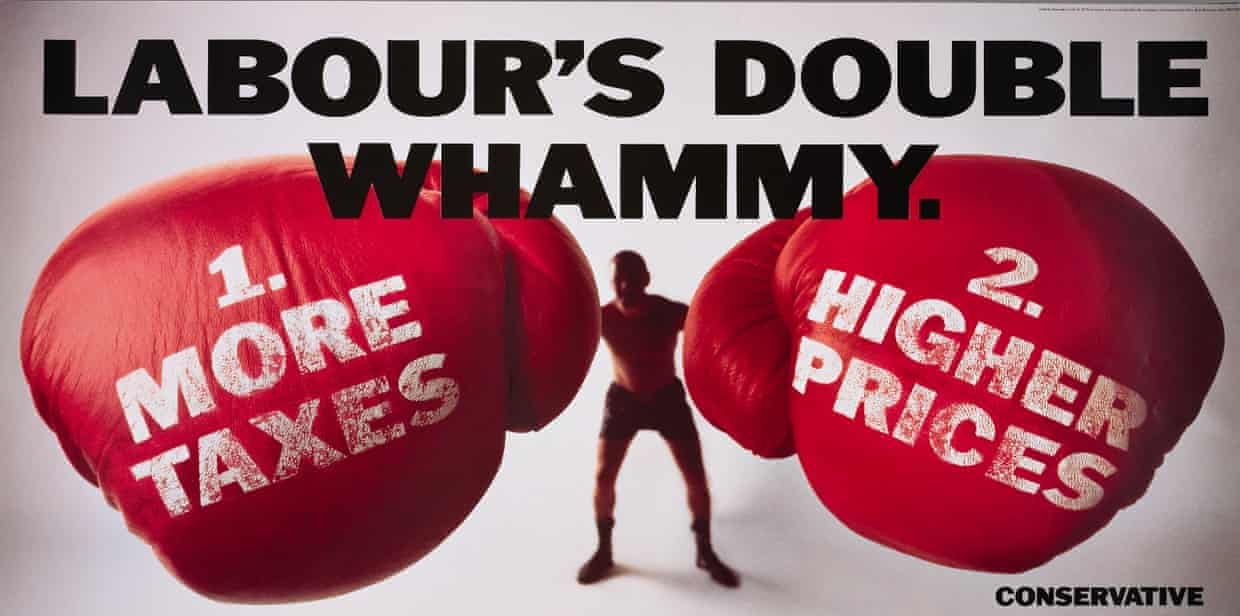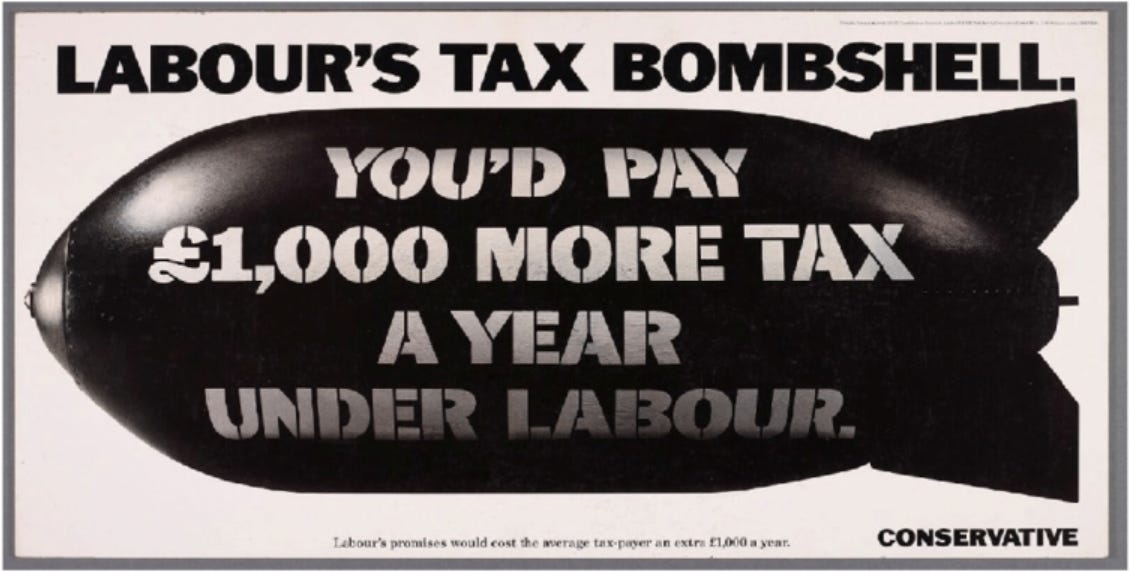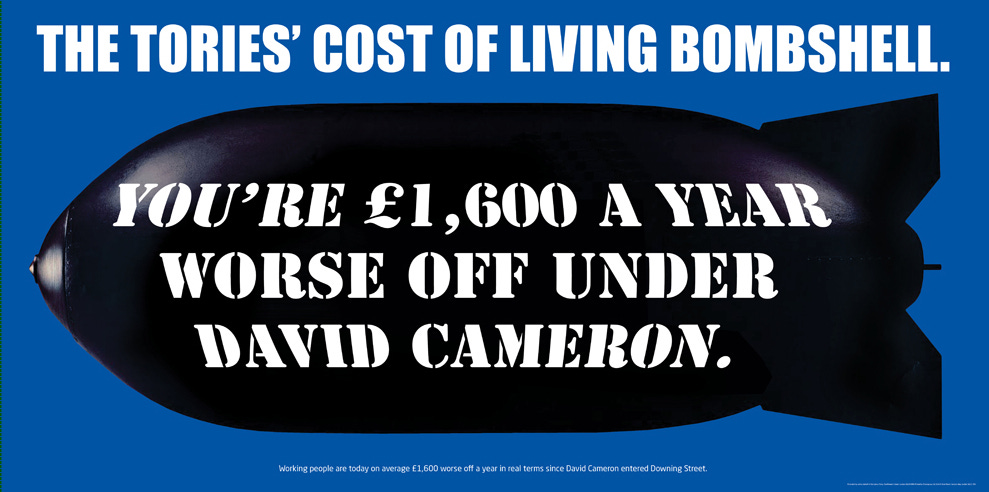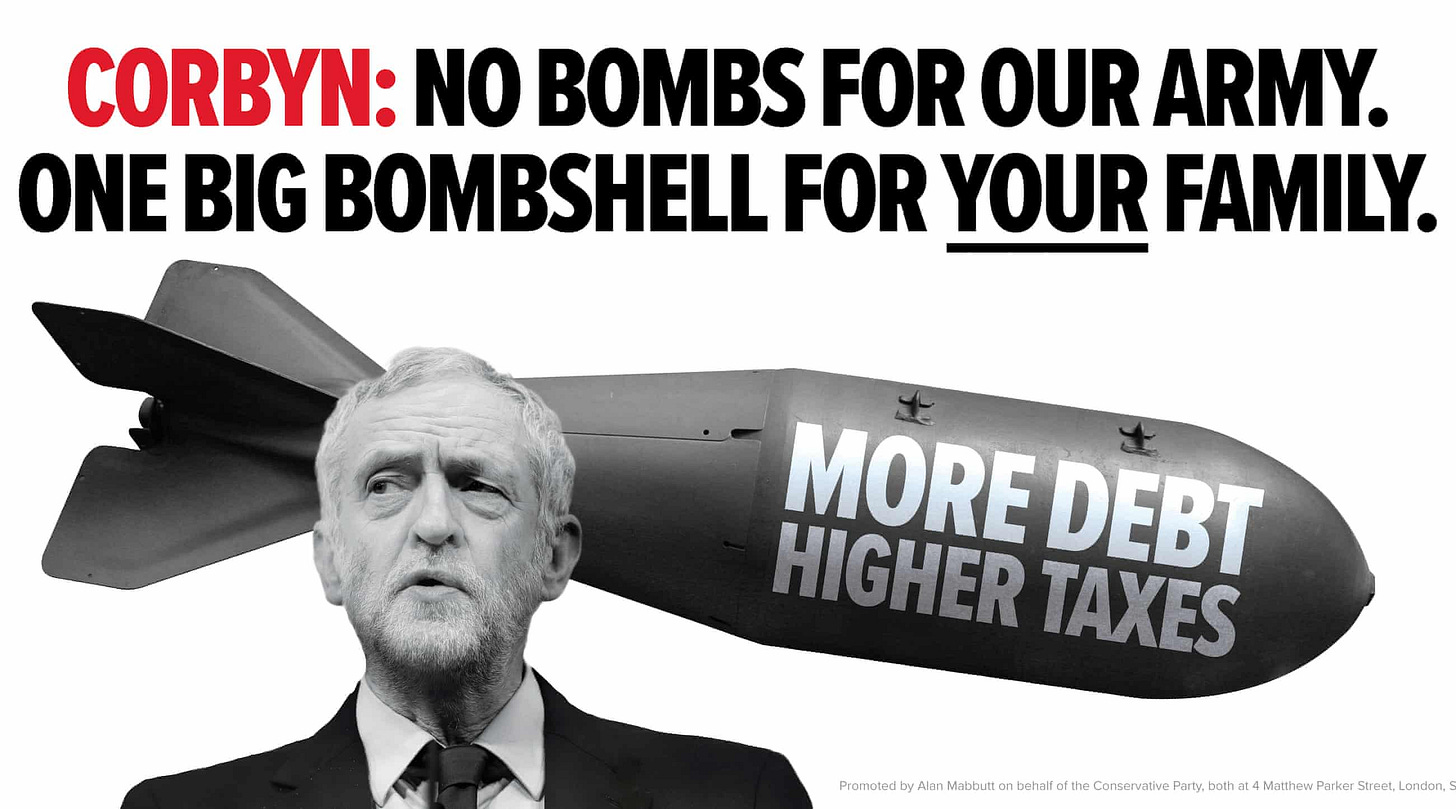Labour have a new poster. Here it is.
It’s not very new or original. It’s an obvious and deliberate rip-off, as you already know and as Labour are not trying to disguise, of this Tory poster from 1992.1
In 1992, of course, the Conservatives were successfully re-elected for a fourth term, in an election in which it looked very possible indeed, based on the opinion polls, that they might lose. One of the reasons for their victory and Labour’s defeat, at least in the popular understanding of what happened, is that voters were spooked by the prospect of Labour tax rises, influenced in part by John Smith’s Shadow Budget, and after considering a vote for Labour decided to stick with John Major after all. This “double whammy” poster, and another poster we’ll get to in a minute, were two of the iconic images of the 1992 campaign, concisely encapsulating the Tory economic threat message that proved so successful.
Iconic posters get ripped off, which is one reason why Labour are ripping it off now. Another reason is that Labour’s deeper message is that they have changed and the Tories have changed, and that one of the ways in which the parties have changed is that Labour are now the party of economic security and the Tories are the party of economic risk.2 Generally speaking, that’s a difficult message for an opposition to pull off, but it’s a lot easier when the incumbent government has made a mess of the economy.
The point of Rachel Reeves’ caution on tax and spending commitments, which is frustrating to people who would like to see Labour promise more money for public services, is that it both closes off routes for Tory economic attacks on Labour, and opens up routes for Labour economic attacks on the Tories. Reeves’ critics on the left complain that her cautious economic policies mean Labour and the Conservatives are the same. Labour are saying here that her cautious economic policies mean Labour and the Conservatives are different - because the Conservatives are not economically responsible.
Labour have tried to rip off this Tory poster before. Here’s an attempt from 2017, in which the eagerness of Jeremy Corbyn’s team to point to three (count them!) potential Tory threats to pensioner incomes trumped a respect for either basic anatomy or the mechanics of boxing.3
And here’s another, absolutely terrible, Labour one, from 2011.4
I said there was another iconic poster from the 1992 election. Here it is.
It’s the same argument again really, this time with a specific number on it: Labour is going to hit you very hard with something. It’s a simple, powerful, memorable image, and so parties have kept on trying to copy it. Here’s an exceptionally aggravating Lib Dem copy of it from 2010.
The reason this one is so aggravating is that this is the Lib Dems arguing - you can read the accompanying press release here - that Tory plans are unaffordable without a 3p rise in VAT. It quotes Nick Clegg (remember him?) saying, “We will not have to raise VAT to deliver our promises. The Conservatives will. Let me repeat that: Our plans do not require a rise in VAT. The Tory plans do.” Just weeks later, the Lib Dems were in government, in coalition with the Conservatives, voting for a 2.5p rise in VAT. So… there you go.
Here’s a Labour copy from 2013. This one, it’s fair to say, didn’t really land.
And here’s a Tory one from 2017.
Like so much about the 2017 Tory campaign, this one is a bit confused: Corbyn has a bomb, but he hasn’t got any bombs, because he hates bombs, anyway, look at his bomb, wait, where’s our majority gone?
Labour have ripped off the Tory bombshell poster again recently, making it a mortgage bombshell rather than a tax bombshell.
Like real bombs, political poster bombshells come in a wide range of sizes: just in this post we’ve had a tax bombshell, a VAT bombshell, a cost of living bombshell, a debt and taxes bombshell and a mortgage bombshell. That’s a quintuple whammy.
One of the most popular debates about the forthcoming general election, if also one of the most annoying ones, is whether it will be more like 1992 or 1997. Will the Tories be able to snatch victory at the last despite being behind in the polls, or will Labour’s sustained poll lead turn into a landslide? The obvious answer is that the current situation is nothing like 1992 and that if the Tories do win from here it will involve a turnaround of an entirely different order of magnitude from that achieved by John Major, and that it isn’t much like 1997 either, but that doesn’t stop it being a good jumping-off point for a column.
When Tory MPs talk wistfully about the possibility that they might do a 1992, there’s more wishful thinking than evidence involved. But the idea that a party might, just as in 1992, be able to capitalise on the failure of their opponents to seal the deal on the economy, and on the public’s lack of faith that they can be trusted on tax or on general economic competence, doesn’t seem that far-fetched. It’s just that this time, if we look at the relative strengths of the parties, and the arguments they feel confident making in their posters, it’s the Tories getting whammied.
On this week’s Election Tricycle, our podcast about this year’s elections in the USA, India and the UK, Rohan Venkat and I interviewed Indian journalist Yashraj Sharma about the role of YouTube, online influencers and deepfakes in the Indian general election (our co-presenter Emily Tamkin was away this week). You can listen and subscribe here, or subscribe to our premium version with bonus content here.
You can buy a framed print of this poster in the Conservative Party’s online shop, and indeed I did so a couple of Christmases ago as a present for a friend of mine who is a Tory adviser, because it was such an accurate and succinct summary of Liz Truss’s legacy. Yes, that does mean I gave some money to the Conservative Party. I am expecting a knighthood imminently.
See my post from a couple of weeks ago on how the Tories’ announcement that they want to abolish National Insurance has given Labour a whole new set of arguments about the economic risk of voting Conservative.
It is not at all clear how the middle whammy here is going to be delivered. Presumably the weird headless mutant thing will just throw its whole body at a terrified pensioner. Also, how is it wearing the glove?
I was horrified to find this just now, via Benedict Pringle’s Political Advertising blog, because it comes from a time when my role at the Labour Party involved signing off this kind of thing and it is, to put it bluntly, crap. I have no memory of it at all and I think this is the first time I’ve ever seen it. As it turns out, to my great relief, it was produced for the 2011 Oldham by-election, so it would have gone through a different signoff chain. Another clue I didn’t sign it off is that there’s no way I would have allowed that apostrophe to go in the wrong place, and I would have protested very strongly at the use of “Con Dem” at all. One of the most depressing features, at least in political campaigning terms, of the generally depressing 2010-15 parliament was the desperation of some people in and (more often) around the Labour Party to get “Con Dems” to catch on as a term for the Conservative-Lib Dem coalition. There are many reasons why Labour lost the 2015 election, and the existence of people who thought that “Con Dems” was clever is not the biggest one, but it is one of the most annoying.













I'm not sure that "Con Dem's" is wrong - the singular form implies the unity of the coalition partners. But perhaps that requires a level of imagination which is otherwise absent from the advert.